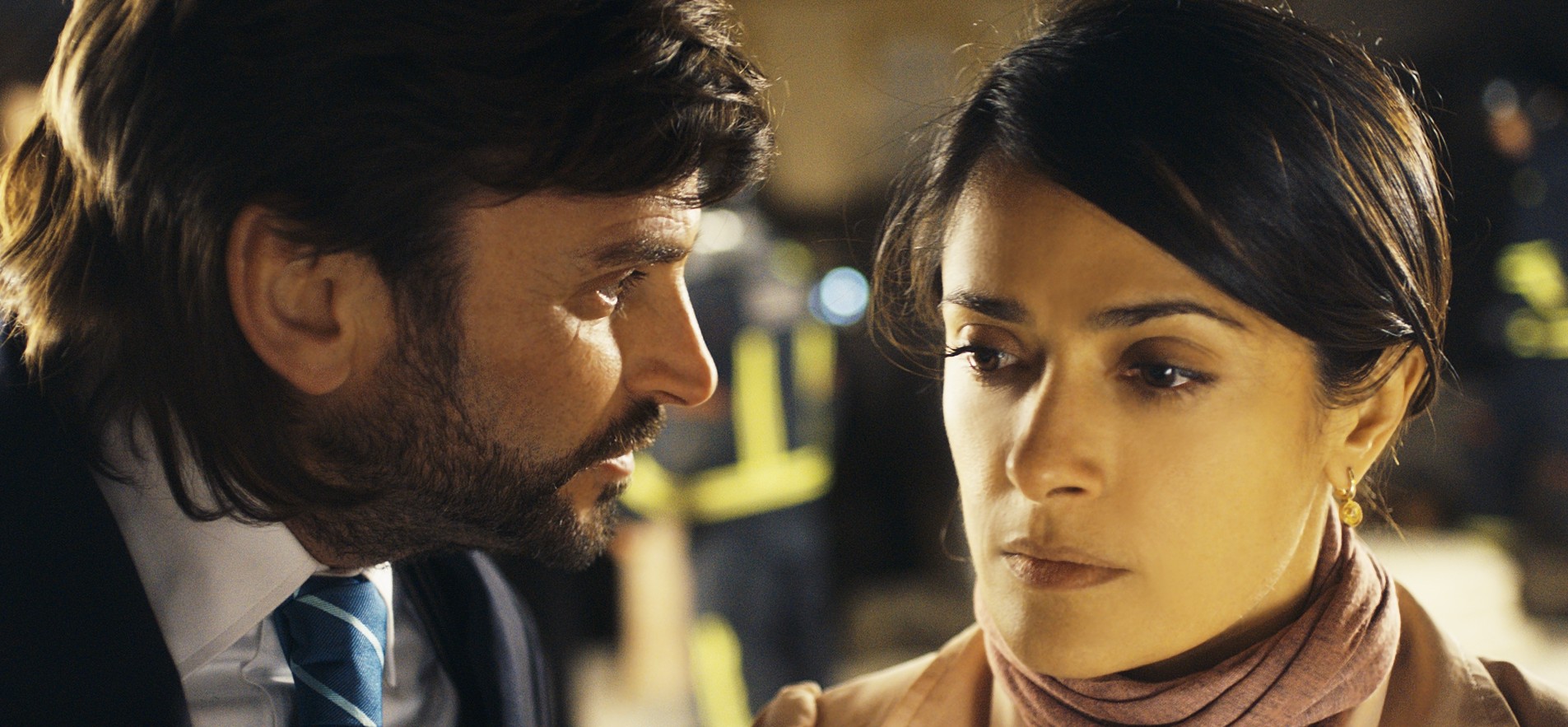By Chlotrudis Independent Film Society
Rating: 4 cats
Director: Álex de la Iglesia
Starring: Antonio Garrido | Blanca Portillo | Fernando Tejero | Jose Mota | Juan Luis Galiardo | Salma Hayek

Original language title: La Chispa de la Vida
Country: france, spain, united_states
Year: 2012
Running time: 95
IMDB: http://www.imdb.com/title/tt1808240/
Jason says: “Is Álex de la Iglesia getting a little soft as he ages? Though he’s not credited with the screenplay here (nor is
frequent collaborator Jorge Guerricaechevarría), it still seems a bit surprising that de la Iglesia, given material with such satiric
potential, would not so much pull his punches as focus on the more sympathetic aspects of the situation. The result is still a very entertaining movie, if not exactly the one people might expect.
“After a failed attempt to find a new job, Roberto Gomez (José Mota) impulsively drives to the hotel in Cartagena where he and his wife Luisa (Salma Hayek) went on their honeymoon, only to find it’s no longer there; the ruins of a Roman coliseum were found on the site and it’s been replaced with a museum. Wandering into a restricted area, he falls into the dig site, impaling his head on a rebar pole. Though he can’t be moved, he’s surprisingly lucid; while the museum directors (Blanca Portillo & Juan Luis Galiardo) try to figure out how to get their opening back on track and a doctor (Antonio Garrido) attempts to treat him in place, Roberto calls an old colleague to get representation in the form of Johnny (Fernando Tejero); he wants a bigger audience (and payday) than local reporter Pilar Alvarez (Carolina Bang) can offer.
“It’s impossible to read the description of this movie and not think of Kirk Douglas in ACE IN THE HOLE, only with the parts of the reporter and trapped miners merged. Looking at AS LUCK WOULD HAVE IT as a remake or updating of that movie will likely lead to disappointment, and not just because Billy Wilder’s movie is a classic. As much as the idea of media feeding frenzies and news as packaged entertainment are as relevant today as ever, it’s actually almost too relevant; such activities are so much a part of the landscape as to make satire difficult. Director de la Iglesia and writer Randy Feldman take a few good rips at the media and the way it distorts everybody’s behavior, but that’s arguably not the film’s main focus.
“Instead, the filmmakers focus on the desperation Roberto feels even before he gets into his unusual situation. His visit to a modern advertising firm is humiliating, wall-to-wall gloss and younger people who take the opportunity that he so desperately wants for granted. Even though de la Iglesia refuses to make old-fogey jokes (of course, Roberto head-banging when he finds some 80s metal on the radio while driving may count as such to younger viewers), the world Roberto knows is still disappearing, and he feels like a failure for his unemployment and the debt his family will be settled with. As cynical as Roberto’s actions may seem to the outside world or how they seem to represent misplaced priorities, they also form the story of a man trying to provide for his family and demonstrate his worth.
“And José Mota does an exemplary job with that. We see hints of this painted on his face and expressed with his body language
as the movie opens, but when the main part of the story picks up and his movement is severely restricted (lay down flat and see how much you can flail your limbs without your head moving; it’s likely less than you think), he does even better, portraying Roberto’s mounting panic in a way that’s honestly frantic but never crosses the line to theatricality, and keeping it just in the background when putting on a brave face or feeling some victory.
“There’s a nice – and surprisingly large – ensemble flitting about him, most doing a pretty good job. Salma Hayek, for instance, is right on as the strong wife nevertheless always on the verge of tears (she seems like a different, more natural actress in a Spanish-language film after so long in Hollywood). Manuel Tallafé is always a welcome presence on-screen as the older security guard who spends the most time talking to Roberto. And Eduardo Casanova is actually pretty impressive in how he plays Roberto’s son Lorenzo more-or-less straight as a guy who loves and has a good relationship with his dad, no matter how gothy makeup and wardrobe make him.
“While de la Iglesia’s film doesn’t quite have the satiric edge that it might – and which, at times, he is clearly going for – it is impressive how he gives a movie about a man stuck in one place grandeur. The blend of the Roman arena and construction site is a wonderfully conceived and executed location for the story, one which de la Iglesia and Kiko de la Rica shoot the heck out of. Roberto’s fall is exactly the sort of huge bit of tragic slapstick that you’d expect from the maker of LA COMUNIDAD, and the movie slips from larger-than-life and very funny naturally. And while it’s arguably the least important part of the story, the procedural efforts to figure out how to move Roberto or treat him in situ are genuinely tense.
“AS LUCK WOULD HAVE IT (or LA CHISPA DE LA VIDA, in the original Spanish) isn’t ACE IN THE HOLE even when that’s what Álex de la Iglesia is going for, but that shouldn’t be held against it too much. It’s a funny, dramatic, and occasionally thrilling film on its own, and that’s good enough. 4 cats
“Seen 25 July 2012 in Concordia University Theatre Hall (Fantasia 2012, 35mm).”
